- Home
- André Aciman
Enigma Variations Page 5
Enigma Variations Read online
Page 5
She inspected the key and the lock. I had never seen either the new key or the new lock before, because while I was working on the box in the shop, Nanni had already removed the lock.
My mother couldn’t help herself and complimented him again. He made a nodding gesture that was meant both to acknowledge yet play down her compliment. He lifted his face and looked over in my direction and cast something that might almost have been the flicker of a complicit smile, and then looked down at the box he held in his hand before setting it upon the refurbished desk, saying nothing. It meant, Let it be our secret.
So we had a secret.
But the real secret was not that I had gone to see him almost every afternoon but that he sensed I didn’t want my parents to know. This was the secret.
It never occurred to me to wonder why he hadn’t brought up my visits, or why he hadn’t acknowledged my role in polishing the box.
I nursed that secret all through my Latin homework that evening. An hour or so later, I went downstairs again, thinking that Nanni had already left, and was surprised to see that he was still there, helping my parents put the two paintings back into their frames. I kept hoping he’d speak to me. But he didn’t. When I walked out to get some water in the kitchen, I could hear him explaining to my parents precisely what he had done to the frames. Then my father, who always managed to make people want to confide in him, asked him what other work awaited him in the shop. There was a moment’s silence. Nanni said he wished to move his shop to the mainland, because though he’d inherited the craft and the shop and the apartment above the shop, he wanted to be more than a cabinetmaker. He was a creator, he said, he was an artist, not just a falegname, a carpenter.
I liked the way he had spoken these last words. They came like the admission of something irreducibly truthful. He was speaking with the most guileless humility and something verging on apology, as though asking for my father’s blessing and friendship. “I am speaking to you as to a father,” he finally said. Why had I never opened up to Nanni as truthfully as he was doing now with my father? Would I ever be able to tell him what I’d done to myself in the chapel while hoping he’d pass by to rescue me? Not in ten years, not in a lifetime. And yet I wanted to, and the thought of telling him aroused me.
Nanni was telling my father that there was also the matter of his younger brother. “I promised my father that I would take care of my brother and set him up in business here. So I have to wait until he grows up. But my dream was always to become a journeyman, a compagnon, as they still have in France, to travel and learn from others. Instead, I worked with my father and grandfather, and that served me well enough—still, I need to go away.”
What I loved seeing was the ease with which he spoke to my father, as so many others did in San Giustiniano. I had never confided in anyone this way, not even my father. What it also told me was that this way of baring one’s soul with people was itself the very essence of friendship, which was something I knew nothing about and was precisely what I craved from Nanni, except that I wanted it with his face, from his hands, his smell. Perhaps I wasn’t capable of such trust or of eliciting it in others. Besides, I was just a kid, and I knew it. Did others even think about friendship as much as I did, or did they simply trust you and become your friend naturally? What had ever come naturally to me?
“But why leave San Giustiniano?” asked my mother.
“I can’t go on here. I’ve grown up here. I know everyone. Plus, there’s so much talk in this town. I want to get away.”
I was so intrigued by this person whom I was hearing for the first time that I stood on the threshold of the living room without walking in, fearing that the least step would interrupt the conversation. I wanted him to keep talking. Why didn’t he speak like this when he was with me? He was drinking something with my parents and was sitting in an armchair leaning forward toward my father, both elbows resting on his thighs, as though he hadn’t finished his admission and was still imploring my parents’ leave to hear him out. When he put down his glass, I had the impression that he was just about to reach out and clasp one of my father’s hands. “I am the last person to give advice,” my father finally said. “Besides, who knows of what value my words are, Nanni. But if you really must go away, maybe Europe is not the place. There’s Canada, for instance. Or New Zealand, Australia, and America, of course. But the world is filled with crooks and hooligans.”
“Oh, crooks and hooligans there are plenty around us, more than you know. It’s not because you don’t see them knocking at your door that they’re not here,” he said, eying my father. Then, turning to my mother: “Things are not easy for me here, Signora.”
“For a moment I was sure he was going to ask us for a loan,” said my mother after Nanni had left. “He’s just the type to.”
“But he didn’t. He would never.”
“He will the next time he comes around—you watch. They’re all the same, these people.”
Many people used to come to visit in the evening only to end up trying to borrow funds at the end of their visit. By then I’d usually be asked to leave the room. But I loved to overhear the labored blandishments preceding their request.
Here nothing of the sort was happening.
“Stay in Europe, Nanni, stay here,” said my mother. “You have no idea what taking the first ferry of the year does to me when I cross the water and leave the world behind and finally walk along the esplanade and make out the scent of the fishing boats along the marina. This is heaven.”
Why was my mother saying this, when none of us could forget that our first ride on the ferry this summer had been an unmitigated hell?
“I have some friends at the Canadian embassy who might be able to help,” said my father.
“My husband and I disagree. Which isn’t surprising. You belong here, Signor Giovanni.” But to show there was no significant rift in our household, she moved toward my father’s armchair and sat on its armrest, placing her hand on his shoulder. It suggested warmth, youth, and solidarity, even if her gesture struck me as a touch mannered and too demonstrative for the occasion. It must have seemed so to my father as well, because he simply sat there, rigid, uneasy, letting my mother do the talking, allowing her hand to rest there until she’d tire. “Ironically,” she said, smiling, “we too may be thinking of moving, especially for Paolo’s schooling.”
Nanni turned and looked at me. “Yes, especially for Paolo.”
The way he spoke these words broke my heart. Yet anything having to do with my school could easily devolve into talk about my Latin and Greek exam, my tutor, and ultimately my visits. I panicked. He must have read my mind and stayed clear of the subject.
“We do everything for our children, Nanni. But then one day they leave us and we lose them,” said my father. It was coming out of nowhere.
“I’m not going to leave you,” I said.
My father mused a moment. “I know, I know,” he finally replied. But I could read him well enough to sense he did not believe what I’d just said, for what he really meant with that pensive inflection in his voice was, You may not want to leave now, but one day you will. He looked at Nanni as though to draw a nodding agreement from him, when suddenly, as happened almost every evening, the lights went out. We waited all of us in the dark. My father lit the three long tapers standing on the candle holder on the living room piano and approached the desk in the middle of the room. He wanted to see it in a different light. It looked more stunning by candlelight. It belonged in a museum. “You are an artist,” said my father as soon we saw the cylinder beam like the most polished Stradivarius. “Anzi, a great artist,” my mother added. I was so happy that I wished we’d stay all four of us in this room forever under the intimate, spare glow of the candles. I wanted it to be dark again. I wanted to hug him in the dark.
When the lights came on, Nanni looked at his watch. “Perhaps it’s time I should get back,” he said.
My father walked him to the door while my mother stayed in the living room
staring at the desk. I was sure my father had stepped aside to pay Nanni’s fee, which is why I didn’t accompany him. As my father did with everyone, he walked Nanni to the end of the garden, opened the gate for him, and then stood there, courteous as ever, watching his guest make his way back toward the marina. Nanni turned back and waved a second time. No one had extinguished the candles yet. It made me think he was still in the room with us.
“A great talent, but a strange one, this Nanni, a bit creepy, if you ask me, don’t you think?” asked my mother once my father shut our main door behind him.
“Yes, very talented.” He didn’t care to sit in judgment.
“Still, something very louche about him. Can you imagine in what seedy digs he must live? What I think he should do is find a nice girl and settle down in San Giustiniano. This is where he belongs.”
“Maybe,” said my father, “but he’s too complicated to settle down with one of those beefy, unshorn town girls. He’s too polished and too handsome for them. He belongs in the great wide world, in Paris, Rome, London, not a fishing hamlet.”
My father’s admiration, unlike mine, was devoid of equivocation. I envied the absence of smokescreens and double-talk in what he’d said. Nothing stealthy or dissimulated about voicing one’s admiration for another man. Indeed, his praise of Nanni was so unhindered that it made me realize I had never said nor would ever be able to say anything of the sort. I’d have made up something crass about him or pointed to a birth defect here, a tremor there, if only to censor anything that betrayed what I felt each time I found the courage to look in his eyes.
That night, in midsleep, I thought of something I’d overheard my mother say and hadn’t wanted to focus on until I could devote myself entirely to it. I thought—or was it dreamt?—of what she called his seedy living quarters above his shop. I knew there was a stairway leading upstairs, but I had never seen where he lived, how he lived. I wanted to see his room, his things, his shoes, his clothes, touch his bed, his bathrobe, his towel. What if, instead of going to school one winter morning, I took the ferry from the mainland and dropped in on him? Would he put me up, help me dry my feet if it rained that day, lend me something to wear until my clothes were dry? I’d work with him, have lunch with him, and take a long nap on his bed in that ratty brown sweater of his that felt of him and smelled of him and spoke of him in the coarse, sacred tongue of things.
* * *
WHAT I FAILED to realize after he had brought the refurbished frames and desk is that I no longer had a reason to visit him in the afternoon. As I drank my usual lemonade in his shop the next day and asked if there was anything else for me to do, he shook his head and said we were done with the work on my parents’ furniture. He looked awkward, tense. Part of me felt he was struggling to find the right words. “With your parents’ desk finished, maybe it’s time you stopped being a manual laborer,” he said, finally landing on the right words with the right inflection of both humor and apology to soften the blow. His brother Ruggiero was busy sandpapering a drawer, but even though he wasn’t turning around, I could tell he wasn’t missing a syllable.
“So I’ve been allowed here so long as I worked for my parents?” I was so shocked by what he’d just said that I couldn’t phrase my disappointment more delicately.
“You helped a great deal,” he replied, deflecting my question, “and you did a fabulous job, they even said so in your home.”
The startled look on my face must have screamed that he should not have told my mother about me. So it had never been our secret.
I tried not to show how totally rattled I felt. What shocked me even more was not just that my mother had known about my visits to the shop, but that she had decided not to breathe a word of them to me. Her silence suddenly cast a cloud on my visits and confirmed that there was always a troubling and furtive character to what I’d been doing in his shop that justified her silence. Earlier, I had thought of asking my parents to have Nanni come over and look at our dining room table and its chairs, as these too looked so old and beaten that they clearly needed restoring. But now my mother would probably see through this and know that it was only a ploy for me to continue visiting his shop.
When I got home, not a word, not a look, nothing. At dinner, I looked over to my father. He too was inscrutably quiet. Something was bound to come out. It was just a question of when.
But the more days that passed with neither one mentioning my visits, the more difficult it became to even speak his name at home. When my mother did speak it once, while asking me to help her move the desk from one corner of the living room to the other—because we still couldn’t find a spot for it—I pretended I hadn’t heard it. But I caught my entire body shaking. Say his name and I froze. Say “Nanni” and all the bulwarks I’d put around this one word suddenly came crashing down. Say his name in the winter when we were back in the city, and I would suddenly feel a thousand pinpricks tickling the crown of my head. I loved his name. It meant far, far more to me than it did to anyone else. No one would understand, much less explain why it filled me with stealthy pleasure, with anguish and shame.
On one of my last afternoons before leaving San Giustiniano, after my tutorial I dropped by Nanni’s shop. He was there, shirtless, working with Ruggiero on a large drawer that was squatting on its hind side on the cobbled alley. I envied him the peace, the heat, the work, the ancient, timeless ritual of it all. And then, as if something were being torn out of my lungs and needed to be said, I finally found a moment when he was alone to tell him. “I’ve never had friends, you’ve been my only friend,” I said, speaking these words without even realizing I had said them. What I’d meant to say was, I was your friend, I wish you’d stayed mine. Instead we hugged as we always did, except that he said, “Scusa il sudore, pardon the sweat.” But that was exactly what I wanted on my face.
I wouldn’t tell my parents about this. They wouldn’t understand. No one would.
The closest I got to understand anything came much later that winter when I walked into our kitchen and made out the scent of turpentine wafting from the open door of one of the adjoining kitchens in the building. Our neighbors were having their kitchen painted. Suddenly, without thinking, I was on that cobblestone lane in San Giustiniano, headed uphill in the scorching late-July afternoon heat, the shoemaker, the locksmith, the barber, every step marked by what the presage of that scent promised once I’d passed the giant cornerstone where the alley took a turn farther uphill toward the caffè and then up to the castle. The turpentine, I realized that day, was the cover, the cloaking device. What I really wanted was his sweat, his smile, the way he’d speak to me, and the smell of his underarms under exertion on those sweltering summer days. And then, in our kitchen and to my undying shame, I remembered what had occurred between us exactly a day after the episode with turpentine in the Norman chapel.
We were going to work on the frames again. We had brought two chairs out in the alley and sat facing each other with the wooden frame placed on all four of our knees, both of us with our tools on the pavement—the large gouge, the smaller gouge, the tiny awls for digging into the florid patterns to remove the encrusted dirt. Sometimes, when he made an effort with his arm, his knee would bump mine and stay in place until he released the pressure on his hand and began working on another spot on the frame. At first, I’d pull back my knee, but soon I learned to keep mine in place and never pulled back. Sometimes our knees stayed so close you’d think they were like twins who’d grown up together and were happy only when they touched. Once, my knee touched his and made a point of pressing against it. His withdrew. So, to punish him and demean him in my mind, I began to think of him naked under his apron, and I liked thinking of him naked. I knew it was wrong, even cruel, but I couldn’t stop myself, I liked looking at his crotch.
While nursing these disturbing images, I suddenly caught him staring at me. Had he watched my eyes roaming all over his body when he stood up? Was he going to be upset that I had stared?
He had stopped speaking. I began to wonder why. Then I saw him still staring at me. And his eyes were so beautiful and, as it hit me for the first time, so thoroughly green, that I had to look at them some more. My impulse had always been to look away to avoid his eyes, but they held me, and I wanted to be held by them, for they were ordering me not to turn away this time, for this was why adults stared each other in the eye: you looked straight back and there was no running away for cover, because you were invited to stare too, because it was no longer a breach of any kind, it was a breach not to stare—which is when I realized that what I’d been craving all this time was his eyes, not his hands, not his voice, not his knees, or even his friendship, just his eyes, for I wanted his eyes to rest forever on me the way they were doing just now, because I loved the way they hovered over my face and eventually landed on my eyes like the hand of a holy man who is about to touch your eyelids, your forehead, your whole face, because his eyes kept swearing I was the dearest thing in the world, because there was piety, grace, and beneficence in his gaze that favored me with its beauty and told me there was no less piety, beauty, and grace in mine. And this, on one of my last afternoons in his shop and in that distant part of the globe, was a wellspring of happiness, hope, and friendship. He had looked at me with sorrow because I was leaving soon. I was his friend. There was nothing more to want. But something broke the moment he said, “You shouldn’t stare at people like this.”
His words cut me. All at once our delicate exchange of glances was out in the open and dashed to pieces, exposed by the very person who should never have been so thoroughly aware of it.
“What do you mean?”
“You’re old enough to know,” he chided. “Or aren’t you?”
Something cold, curt, almost ill-tempered in this short snub couldn’t begin to chime with the grace and tenderness of a moment earlier. Had I made the whole thing up?
I immediately averted my eyes and kept looking away, as if to prove him wrong and to show that something to my left had caught my attention and had nothing to do with him. But I had begun to shake. I had violated something. But what? All I knew was that he had put me in my place—and in the process left me feeling totally numbed. Never had I been scolded without anger in someone’s voice, or felt so easily unraveled by words that were neither hostile nor harsh, which was why they hurt so much—because he might have meant them kindly, because I knew he was right, because he could see right through me, and I disliked this so much yet liked it so much. I had hoped to cross a line while staring and get away with it without his knowing or calling me on it. This was worse than being scolded by a schoolteacher, or caught lying or stealing, worse than when I’d made an obscene gesture at a fruit vendor only to see the old man turn to me and say, Svergognato, shameless. Nanni might as well have said Svergognato. He had seen who I was, construed every filthy bend in my heart and read my foulest thoughts—he knew, knew everything, knew what I’d been looking at the moment he had stood up to fetch sandpaper, knew what I was doing when I touched his knee. I felt so trounced by the implied reprimand in his quiet words that I was about to ask him please not to tell my parents.

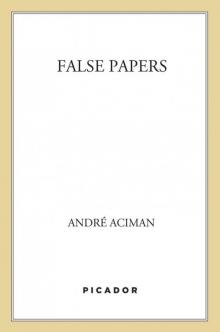 False Papers
False Papers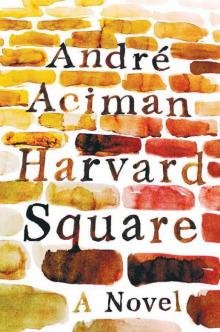 Harvard Square
Harvard Square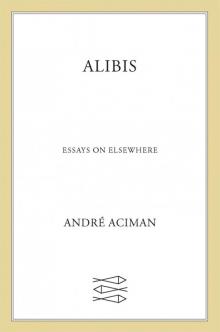 Alibis
Alibis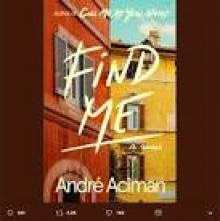 Find Me
Find Me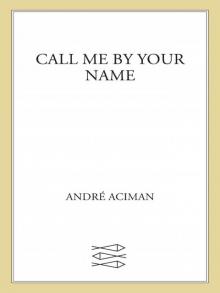 Call Me by Your Name
Call Me by Your Name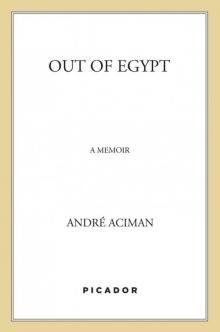 Out of Egypt: A Memoir
Out of Egypt: A Memoir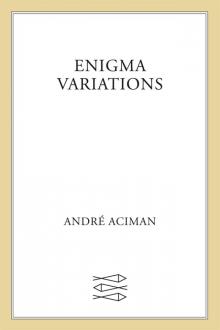 Enigma Variations
Enigma Variations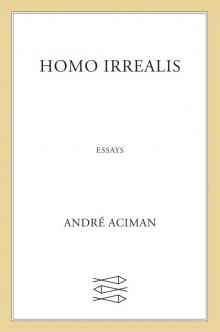 Homo Irrealis
Homo Irrealis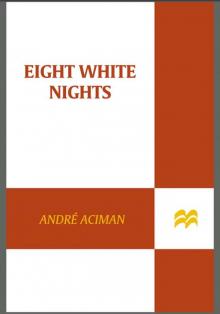 Eight White Nights
Eight White Nights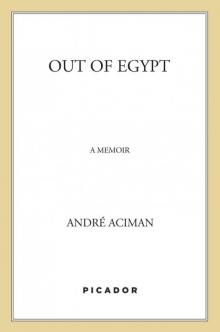 Out of Egypt
Out of Egypt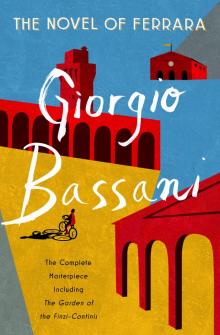 The Novel of Ferrara
The Novel of Ferrara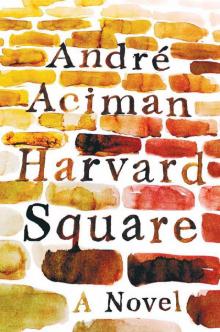 Harvard Square: A Novel
Harvard Square: A Novel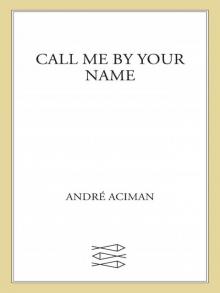 Call Me by Your Name: A Novel
Call Me by Your Name: A Novel